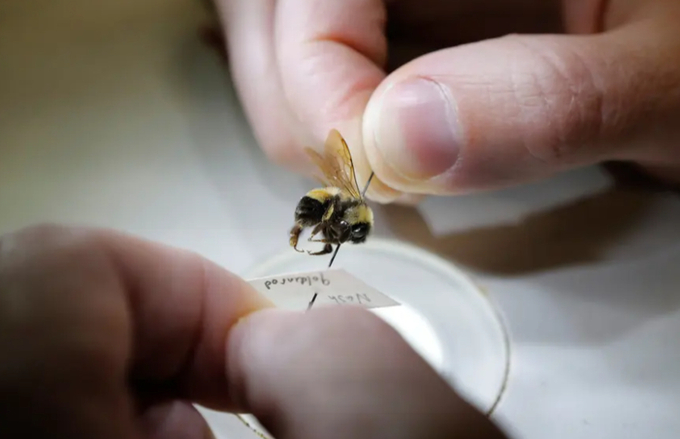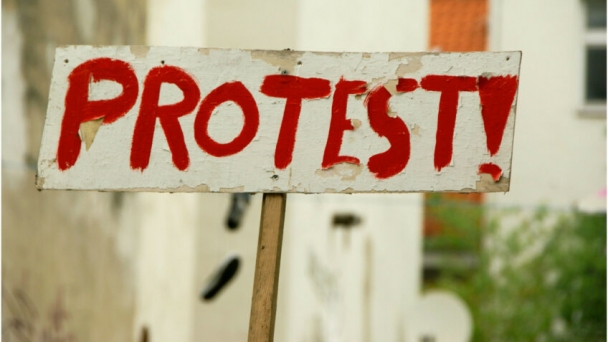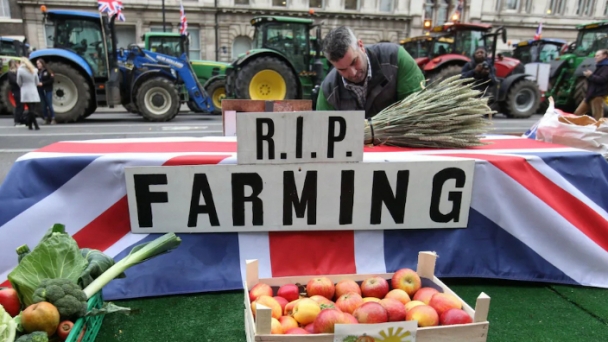December 16, 2024 | 17:52 GMT +7
December 16, 2024 | 17:52 GMT +7
Hotline: 0913.378.918
December 16, 2024 | 17:52 GMT +7
Hotline: 0913.378.918

A researcher holds a bumblebee under a microscope in Hallowell, Maine. Photo: Portland Press Herald/Getty Images
When Stephen Buchmann finds a wayward bee on a window inside his Tucson, Arizona, home, he goes to great lengths to capture and release it unharmed. Using a container, he carefully traps the bee against the glass before walking to his garden and placing it on a flower to recuperate.
Buchmann’s kindness – he is a pollination ecologist who has studied bees for over 40 years – is about more than just returning the insect to its desert ecosystem. It’s also because Buchmann believes that bees have complex feelings, and he’s gathered the science to prove it.
This March, Buchmann released a book that unpacks just how varied and powerful a bee’s mind really is. The book, What a Bee Knows: Exploring the Thoughts, Memories and Personalities of Bees, draws from his own research and dozens of other studies to paint a remarkable picture of bee behavior and psychology. It argues that bees can demonstrate sophisticated emotions resembling optimism, frustration, playfulness and fear, traits more commonly associated with mammals. Experiments have shown bees can experience PTSD-like symptoms, recognize different human faces, process long-term memories while sleeping, and maybe even dream.
Buchmann is part of a small but growing group of scientists doing what he calls “fringe” research seeking to understand the full emotional capacity of bees. His research has radically changed the way he relates to the insects – not only does he now avoid killing them in his house, he has also significantly reduced lethal and insensitive treatment of specimens for his research.
“Two decades ago, I might have treated a bee differently,” Buchmann says.
The new field of study could have significant implications for agriculture, an industry where bees are critical. That’s because approximately one-third of the American diet, including many fruits, vegetables and nuts, relies on bees for pollination. In the past, bee research has focused on their role in crop pollination, but the work being pioneered by Buchmann and his contemporaries could force an ethical reckoning with how the animals are treated.
Commercially managed bees are considered livestock by the US Department of Agriculture (USDA), and are treated as a workhorse for food production, just as cattle in feedlots serve the beef industry. This mechanized approach to pollination makes no allowances for the kinds of revelations about bees’ emotional lives that scientists like Buchmann have recently discovered.
“Bees are self-aware, they’re sentient, and they possibly have a primitive form of consciousness,” writes Buchmann. “They solve problems and can think. Bees may even have a primitive form of subjective experiences.”
Evidence supporting insect sentience offers clues to what may be driving “colony collapse disorder”, in which entire honeybee hives die within a single season – a phenomenon that has caused the population of these essential pollinators to precipitously drop over the last two decades. While the cause has been primarily attributed to pesticide use, Buchmann and other scientists argue the decline is also due to psychological stress caused by the brutal practices of industrialized agriculture.
Their work is raising practical and existential quandaries. Can large-scale agriculture and scientific research continue without causing bees to suffer, and is the dominant western culture even capable of accepting that the tiniest of creatures have feelings, too? Buchmann hopes an ethical shift will happen as details about the emotional lives of invertebrates – especially bees – are shared with the public.
“We are blasting bees with huge amounts of agrichemicals and destroying their natural foraging habitats,” says Buchmann. “Once people accept that bees are sentient and can suffer, I think attitudes will change.”
‘A crazy hippy idea’
Because a bee’s brain is so tiny – the size of a poppy seed – it’s only in the last decade that research technology has become sophisticated enough to analyze its neurobiology. Before these innovations, most scientists studying the insects assumed there could not be much going on in a brain so small and with so few neurons. Insects were considered to be like instinct-driven robots, with no capacity to feel pain or experience suffering.
Now, that premise is being turned on its head. “If someone would have told me 30 years ago that there might be emotion-like states in bees, I would have regarded that as a crazy hippy idea,” says Lars Chittka, who has been working with bees since 1987 and is a professor in sensory and behavioral ecology at Queen Mary University of London. Chittka is the author of the 2022 book The Mind of a Bee and his pioneering research is featured prominently in Buchmann’s book.
Chittka’s attitude about what bees are capable of changed over time as he performed studies on how bees learn and process information. During a study 16 years ago, Chittka’s lab set out to determine if bees could learn to avoid predators purely as an adaptive response. The experiment employed a robotic crab spider that lurked in flowers, briefly grabbing a bee and then releasing it unharmed.
After that negative experience, the bees learned to scan the laboratory’s flowers to make sure they were spider-free before landing. But much to Chittka’s surprise, some bees also seemed to exhibit what he describes as a kind of post-traumatic stress disorder. “The bees not only showed predator avoidance but they also showed false alarm behavior,” says Chittka. “After scanning a perfectly safe flower, they rejected it and flew away, seeing a threat where there was none.”
More recently, Chittka and other scientists studied bee behavior in response to fluctuations in the feelgood neurotransmitters dopamine and serotonin. Mood-regulating chemicals increased when bees received a surprise reward of sucrose, similar to when humans enjoy a sweet treat. The improved mood led bees to have more enthusiasm for foraging compared with bees who received no reward. Alternatively, when bees were shaken in a tube or otherwise put in an anxiety-producing situation, dopamine and serotonin decreased. Buchmann reports in his book that studies have discovered bee brains “have their own internal opioid pleasure centers”.
Both Chittka and Buchmann suspect other insects could possess sentience and emotion-like states too, but studies have not been conducted to prove it. However, Chittka also says bees are in a class by themselves as pollinators, because this vital ecological role probably requires a uniquely sophisticated mind.
Bees are the only pollinators that must get enough food for themselves as well as harvest large amounts of pollen and nectar to support their colony. They must memorize the landscape, evaluate flower options and make quick decisions in a constantly changing environment. Chittka likens it to shopping in a grocery store, where you are rushing up and down aisles comparing products for the best deals and keeping a mental account before you return to the product you ultimately decide to buy.
“This is not a trivial challenge,” says Chittka. “Different flowers are blooming from one week to the next. And a flower patch you discovered in the morning that was rewarding might be depleted by competitors half an hour later so you have to readjust.”
Such findings have forced some to reconsider how bees are treated in a laboratory setting. Chittka says he would not run a traumatic experiment like the crab spider test today, but that he did not know such an outcome was possible back then. While Chittka now only conducts experiments he considers “ethically defensible”, this is not the case for others in his field, particularly when it comes to research on farming and pesticides.
Part of the problem is that there are no animal welfare laws in the United States protecting insects – or any invertebrates – in a lab setting, unlike mice and other mammals. Often, experiments are deliberately designed to stress and kill bees in order to figure out how much the insects can tolerate in the fields.
“Many of my colleagues do invasive neuroscience experiments where bees have electrodes implanted into various body parts without any form of anesthesia,” Chittka says. “The current carefree situation that [invertebrate] researchers live in with no legal framework needs to be re-evaluated.”
A devastating threat
While untold numbers of bees are killed for scientific research, this pales in comparison with the number that die while pollinating mass-produced crops, particularly almonds. More than 2m colonies – about 70% of commercial honey bee colonies in the US – are trucked to California’s almond groves every February and subjected to the perils of industrialized agriculture, from pesticides to disease, with billions of bees perishing every year.
But finding a way to mass-produce crops while reducing pain and suffering for bees is a daunting undertaking. If vegetarians and vegans who avoid eating animals for ethical reasons were to apply the same standards to foods pollinated by bees, they would have very little on their plates.
“We can’t produce nutritious food in this country without bees,” says a longtime agricultural entomologist working for the USDA. The scientist asked not to be named for fear of retribution by animal rights activists. While attempts have been made to develop mechanical drones that can pollinate crops and to create self-pollinating plants, nothing comes close to the efficiency of nature’s original technology.
“We need to make sure that everybody has access to optimum nutrition that is affordable,” says the entomologist, who is concerned about food deserts in the US. “And we need bees to accomplish that.”
Commercial pollination is also big business. The California almond industry, which relies almost completely on honeybees, rakes in more than $11bn a year and is the third-most-profitable commodity in the state.
The USDA invests heavily in research to help commercial beekeepers manage disease in their colonies and figure out ways to counteract the stress bees experience in pesticide-laden fields. However, the delicate dance between a bee and a flower could rely as much on the mood of the bee as it does on interventions by beekeepers. And statistics show bees have not been in a good mood lately. According to the non-profit Bee Informed Partnership, commercial beekeepers lost 39% of their colonies in the 2021-2022 growing year. This was just a tad lower than the previous year’s loss of 39.7%, the highest mortality rate on record.
While some agricultural operations have tried to improve the survival rate for bees by reducing pesticide use and planting more diverse forage beyond a single crop, a California startup called BeeHero is among the first commercial pollination services to directly address the issue of animal welfare.
The company uses electronic sensors that are placed in hives to monitor the sounds and tonal vibrations of the colony, which BeeHero says reflect the bees’ emotional state. “There is a throb or hum to a colony that is similar to a human heartbeat,” says Huw Evans, head of innovation for BeeHero. “Our sensors feel that hum the way a doctor hears a patient’s heartbeat with a stethoscope.”
The data from the sensors is collected and analyzed for any variations that could indicate harms being caused by the surrounding environment. The information is also fed into an app that beekeepers can use to track the health of their hives in real time. In addition to periodically driving into the fields to physically inspect their hives, beekeepers can also check on their bees 24/7 through their phones.
BeeHero has raised $64m in venture capital and is pollinating approximately 100,000 acres of California almond groves. But not everyone – Buchmann included – thinks technology that monitors bee health is the right path forward. Buchmann instead wants a solution that addresses the root cause by changing industrial agricultural practices to be more bee friendly so there is no need to put sensors in hives. When he was attending graduate school at the University of California, Davis, in the 1970s, the almond industry was much smaller and the groves were filled with a diversity of flowering plants, like a well-stocked supermarket that blanketed the ground beneath the almond trees.
“The ground used to be buzzing with bees,” recalls Buchmann. “But no more. Now the almonds fall on bare ground or plastic sheeting and are vacuumed up by big harvesting units.”
For Buchmann and Chittka, the reason for creating a world where bees can be happy is much bigger than the human need for crop pollination. Both men say they have been profoundly changed by their discoveries of emotion-like states in bees. The mysterious, alien mind of a bee fills them with a sense of wonder as well as a conviction that creatures without a backbone have rights, too.
“These unique minds, regardless of how much they may differ from our own, have as much justification to exist as we do,” says Chittka. “It is a wholly new aspect of how weird and wonderful the world is around us.”
(The Guardian)

(VAN) The Boiling River regularly reaches 86oC - with drastic consequences for the surrounding rainforest.

(VAN) For the second time in a month, hundreds of UK farmers took to the streets of London in protest against Labour Party farm inheritance taxes, among other issues.

(VAN) Poor weather to blame for hampering ability to sow and damaging growing conditions.

(VAN) The report was presented at the International Soil and Water Forum 2024 in Bangkok.

(VAN) The event showcases a new climate challenges and strategies publication, while the inaugural Mountain Future Award includes honours for initiatives from India and Rwanda.

(VAN) Now a new report concludes around 80% of Brazil’s leading beef and cow leather companies and their financiers have made no commitments to stop deforestation.

(VAN) China's exports slowed sharply and imports unexpectedly shrank in November, in a worrying sign for the world's No. 2 economy as Donald Trump's imminent return to the White House brings fresh trade risks.